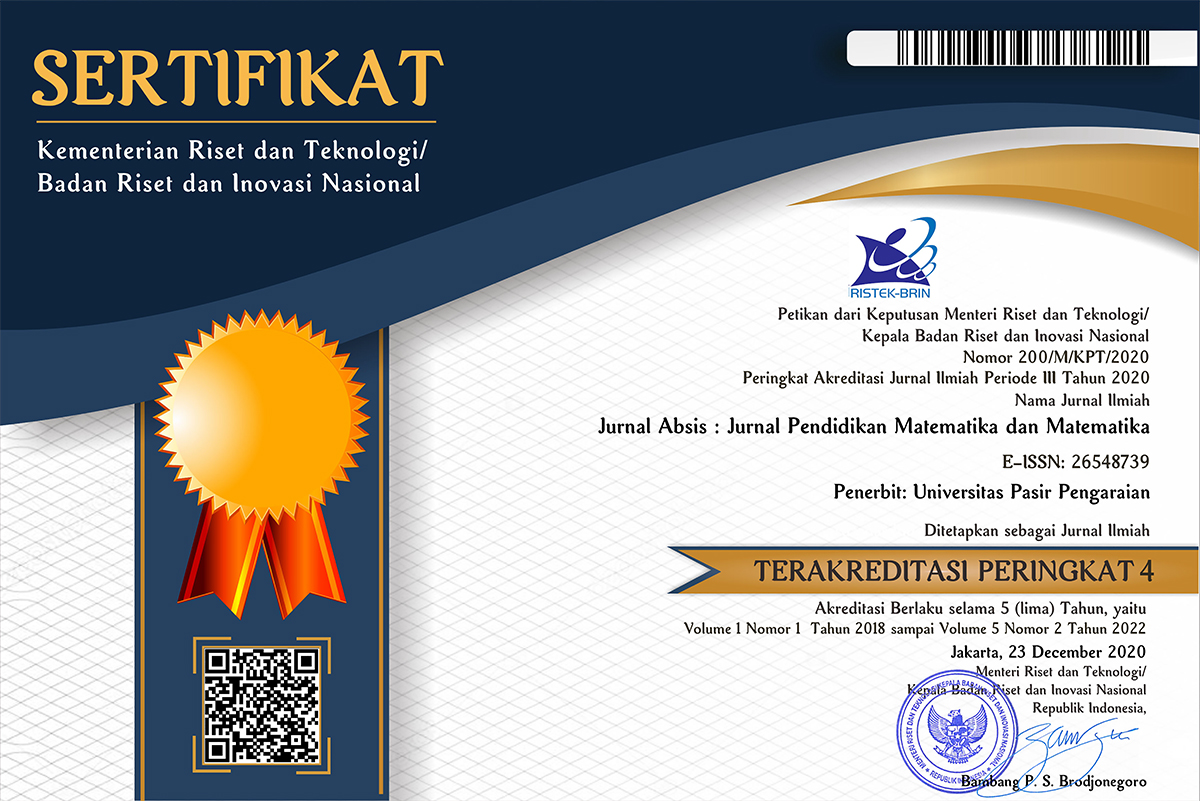Analisis Kemampuan Koneksi Matematis Mahasiswa ditinjau dari Self Regulated Learning(SRL) pada Pembelajaran Daring
DOI:
https://doi.org/10.30606/absis.v4i1.1066Keywords:
Mathematical Connection Ability; Self Regulated Learning (SRL); Online Learning;Abstract
This study aims to examine the ability of mathematical connections to be viewed from independent learning (SRL) in learning flat geometry courses. One class sample, namely second-semester students, collected 26 people, the mathematics education study program STKIP La Tansa Mashiro Rangkasbitung-Lebak, the 2020/2021 academic year. This type of research is descriptive qualitative chosen because it aims to describe the ability of students to solve math problems independently. The instrument used in this study is 30 questions for high, medium and low-level SRL, aiming to determine student learning independence. In contrast, five questions are given through the WhatsApp class group for the test instrument for mathematical connection abilities used in descriptions. The subjects in this study were selected based on active students and had good grades during bold learning activities. Then the interview test process was carried out six about the explanation between the researcher and the research subject. The results of the analysis of students' mathematical connection abilities, the mean value of the complete subject type SRL group = 96 with a score of 100%, moderate SRL of semi-complete type = 92.67 with a score of 90%, and Low SRL of incomplete type = 91 .67 with a score of 80%. Based on this, it shows that the value of the SRL category (high, medium, low) in the bold learning done after the analysis significantly affects the students' mathematical connection abilities.
Downloads
References
Ahmadi, A . 2013. Psikologi Belajar, Jakarta: Rineka Cipta.
Anandita, G, P. 2015. Analisis Kemampuan Koneksi Matematis Siswa SMP Kelas VIII pada Materi Kubus dan Balok. (Tesis Universitas Negeri Malang, 2015).
Bahr, Damon L and Garcia, Lisa Ann de. 2010. Elementary Mathematics is Anything but Elementary: Content and Methods from a Development Perspective. USA: Wadsworth, Cengage Learning.
Bergeson, T. 2000. Teaching and Learning Mathematics: Using Research to Shift From the “Yesterday” Mind to the “Tommorow” Mind.
Djamarah, Syaiful. 2011. Psikologi Belajar. Jakarta: PT Rineka Cipta.
Elyaniar, 2012. Peningkatan Kemandirian dan Hasil Belajar Matematika Melalui Problem Based Learnig bagi Siswa Kelas VIII SMP Negeri 3 Wonogiri.
Fitria, D.H. 2009. Pengaruh Kemandirian Belajar Siswa terhadap Prestasi Belajar Matematika di SMP Negeri Depok.
Gordah E. K. 2009. Meningkatkan Kemampuan Koneksi dan Pemecahan Masalah Matematik melalui Pendekatan Open Ended : Studi Eksperimen di Suatu SMAN di Bandung. S2 thesis, Universitas Pendidikan Indonesia.
Lestari, P. 2011. Peningkatan Kemampuan Koneksi Matematis Siswa SMK melalui Pendekatan Pembelajaran Kontekstual. Prosiding Seminar Nasional Pendidikan Matematika. Bandung: STIKIP Siliwangi.
NCTM, 2000. Principles and Students for School Mathematics. Reston, VA: NCTM
NCTM, 2006. Curriculum and Evaluation Standards for School Mathematics. Reston, VA: NCTM.
Permana, Y. & Utari, S. 2007. Mengembangkan Kemampuan Penalaran dan Koneksi Matematik Siswa SMA melalui Pembelajaran Berbasis Masalah. Educationist. 1(2): 116-122.
Pranoto, I. 2013. Pakar: Pendidikan Indonesia Rendah Daya Nalar.
Ruspiani, 2000. Kemampuan Siswa dalam Melakukan Koneksi Matematika. Tesis Jurusan Matematika. UPI Bandung.
Sofiatun I, (2020). Kemampuan Koneksi Matematis Ditinjau dari Kemandirian Belajar Siswa Kelas VIII Pada Model Pembelajaran CMP Bermuatan Etnomatematika. Under Graduates thesis, Universitas Negeri Semarang.
Sugiman, 2008. Koneksi Matematik dalam Pembelajaran Matematika di Sekolah Menengah Pertama. Yogyakarta : FPMIPA UNY.
Sugandi, Achmad. 2000. Belajar dan Pembelajaran. Semarang : IKIP PRESS.
Varol, F., & Farran, D.C. 2006. Early mathematical growth: How to support young children’s mathematical development. Early Childhood Education Journal, 33(6), 381-387.
Woolfolk, A. 2007. Social cognitive and constructivist views of learning (Chapter 9). Educational Psychology (p. 204-245). Upper Saddle River, NJ : Prentice Hall.
Yuniawatika. 2011. Penerapan Pembelajaran Matematika dengan Strategi REACT untuk meningkatkan Kemampuan Koneksi dan Representasi Matematik Siswa Sekolah Dasar. Prosiding Seminar Nasional Pendidikan Matematika. Bandung: STIKIP Siliwangi.
Zimmerman, B.J & Schunk, D. H. 1989 (Eds). Self-regulated Learning and Academis achievment: Theory, Research, and Practice. New York: Springer – Verlag.








